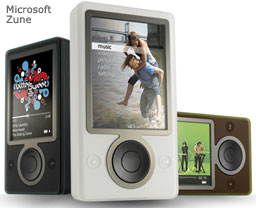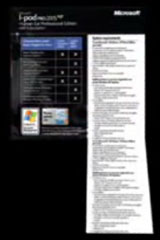I was reading about Zune, Microsoft’s recently announced music system, the other day, when I ran across Zune vs. iPod: Why Microsoft Might Lose the Battle at Playfuls.com:
Microsoft plans to cut from iTunes’ market share with a piece of software integrated into its small MP3 player that will examine your current iTunes library for songs you’ve already bought from iTunes and let you download them from the Microsoft store for free. How about that?
2-for-1 from Microsoft
Okay, let’s see. You can either buy music from Apple and automatically get a free copy for your Windows machine, or you can buy from Microsoft and have a multistep and difficult path (we’re talking Windows here) to convert the music into a form that the iPod can use.
Hmm, on the surface it sounds like an advantage for Microsoft, because it gets their foot in the door. On the other hand, it might actually drive sales for Apple, because if you buy from Apple you get an easy 2-for-1 with your Microsoft player – but if you buy from Microsoft, it will only be usable on the Microsoft player unless you’re one notch above a basic user.
 I just don’t see Microsoft making it as easy to put its music on the iPod as it will be to put the iPod’s (iTunes’, really) music on the Zune. Still, if Microsoft’s only objective is to let its music store be a loss leader to sell ZunePods (or whatever they’re going to be called), then giving music away for free is nearly perfect.
I just don’t see Microsoft making it as easy to put its music on the iPod as it will be to put the iPod’s (iTunes’, really) music on the Zune. Still, if Microsoft’s only objective is to let its music store be a loss leader to sell ZunePods (or whatever they’re going to be called), then giving music away for free is nearly perfect.
Even better would be some exclusive contracts with specific artists, but we all know this is about the technology, right? People buy players for the features, not because of the music. Right? Right?
Marketing Zune
Think Secret thinks that the new device’s approach is going to center on having a plethora of new features that iPods don’t have; such as Sirius radio and gaming.
Gaming is the only area where Microsoft has a real marketplace chance against the iPod. Of course, this has always been the Microsoft approach. The problem for them will be the interface and robustness of the device. If they’re going to use this approach, it had better be easy to use and not prone to freezing or data loss, or people will stick with the iPod.
One of the things that’s always been curious to me is why Apple named the iPod the iPod in the first place. It’s a curiously music-neutral term. They didn’t call it the iPlayer or iMusic, after all.
Prior to the iPod, the most likely association had with pods were peas and really spooky Donald Sutherland movies. That leaves “pod” open to all sorts of interpretations and uses, such as the video clips and calendar/phone book synchronization that is currently in use. Who knows what else might be integrated?
If you can control it with a click wheel, it might be put on an iPod.
Doomed to Failure
Anyway, the new services and devices offered by Microsoft are probably doomed anyway. Let’s see why…
Accessories: Companies already make accessories for iPods. While it’s no great shakes to adapt things like speakers and carriers to new players, Apple enjoys a tremendous advantage in its installed base. Even Radio Shack has an iPod section. iPods get their own aisle in some Target stores.
Business Model: Apple doesn’t make a lot of money on iTunes sales, but at least it pays for itself. How long will Microsoft be able to give music away for free before the red ink washes away its business model?
Compatibility: Microsoft will claim to have an advantage here, but the problem is that most people want their music service to be compatible with the iPod, not with the OS or anything else.
Double-cross: There’s going to be some negative press unless Urge users and vendors are automatically Zune-compatible. They must be feeling double-crossed right now.
Expandability: iPods are self-contained and not expandable by definition. If the Zune has a memory card and the record labels allow users to copy music onto memory cards and transfer it to another device without a computer involved, that will destroy Apple’s market share. The only thing is, the labels would be insane to allow it; they might as well bless the old Napster and let it restart – not that I’d mind.
 Features: The Zune will undoubtedly have a feature list twice the length of an iPod’s (image taken from the infamous “if Microsoft marketed the iPod” video). Apple has always said it’s not how much you do, but how well you do what you do. This will be a test of that assumption.
Features: The Zune will undoubtedly have a feature list twice the length of an iPod’s (image taken from the infamous “if Microsoft marketed the iPod” video). Apple has always said it’s not how much you do, but how well you do what you do. This will be a test of that assumption.
Games: The only area in computing where Microsoft completely dominates Apple might be its iPod-killer weapon of choice. The catch is that powerful gaming comes at a price – weight, power consumption, complexity, and durability (I remember destroying several Atari joysticks in my attempts to defend the universe). Will consumers care, or will Apple have to respond?
HP: How will Microsoft’s partners react to Zune? Will it be a default install on new computers, or will users have to download Zune (the service)?
Interface: History suggests that Zune will be somewhat difficult to use and loaded with too many features.
Juxtaposition: Users in stores will look at Zune (the device) next to iPods. Which one will look cooler?
Krusty the Clown: Krusty is the king of product placement in the Simpson’s universe. Much like Apple is in ours, his products pop up in everyday life. Look up “ubiquitous”, and there’ll be a picture of a Krustyburger. Will Microsoft have the savvy and the media connections to get famous people to endorse the Zune player? Will we see it in movies soon? (By the way, it’s an axiom of Vaudeville that anything that starts with a “K” is automatically funny. For example, in The Sunshine Boys by Neil Simon, they talk about a Kornheiser. Maybe that’s why you don’t see a K-box or a KrustyPC or everyone only goes to K-Mart when they can’t stand Walmart any longer. But I digress.)
Looks: How can a multifunction device look more elegant and easy to use than an iPod? iPods have practically no interface to speak of, and the word on the street they may lose that with some magic finger-waving interface.
Microsoft: Microsoft is evil. Everyone knows it. Hats off to Mr. Gates for his philanthropic tendencies of late, but it’s sort of like Mob money: nice to have it, but hard to sleep at night. On the other hand, that doesn’t seem to bother computer purchasers. Will music purchasers be swayed?
Nano: Will Zune (the system) have a variety of players at different capacities? Will Microsoft attempt to make every device do everything, or let simple devices, like Apple’s iPod nano and especially the shuffle, do less?
Operability: Microsoft will pick up some bad press if its system is not Mac-compatible. Especially in France.
Popularity: iPods are popular, and word of mouth counts. The first user experiences with Zune will establish the tone of the buzz around the device for months.
Quality: Despite manufacturing problems with batteries and easily scratched finished, iPods in general are pretty tough and stable. My old 3G iPod would crash about once every month or two, usually when I was trying to do some nonstandard thing. My current 5G iPod (purchased when Taylor Hicks won American Idol and I won a pool – thanks, Taylor!) has yet to crash, and I’ve tried even weirder stuff with it. Nothing like trying to make it boot Linux, but more than the average user would do.
Shuffle: Can anyone see Microsoft actually selling a device that only does two things: store files and play music?
TV: Will Microsoft’s new service, including the BOGO (buy one, get one free) scheme, include Apple’s growing TV listings?
Urge: Usually when people have Urges, it has to do with going to the bathroom or other unsavory habits. When’s the last time you said you had the urge to listen to music? But really, what is the relationship between Urge and Zune? Don’t they compete? Will they be interoperable? Most importantly, will they confuse the user?
Variables: There are a lot of variables in the portable music business. How many features are necessary? How much will customers be willing to spend? How many labels can you get to release music for your service? Judging by the number of startup services, it must be pretty easy to get music labels to sign a distribution contract, and the world has Apple to thank for that. My feeling is that getting this business to work right is sort of like the triple-point of water: conditions have to be just right, and balanced, for everything to work the way you want. Apple has found a sweet spot that has been stable for a few years now. Can Microsoft?
Xbox: If Apple did make a gaming console, it would at least be partially interoperable with Macs and iPods. Will the Zune device interface with the Xbox? Will a next-generation Xbox be Zune (the service) compatible?
Y: Y, indeed. Y is Microsoft double-crossing all of its partners who use the Urge service? How will that play out in the markets – and the courts? Y is Microsoft apparently using the same term for the service and a device? Y is the mainstream press so anxious to find the one true iPod killer?
Zune: The name’s a problem. At least a pod is a thing you put stuff in. What’s a Zune? A Zoom Tune? A Zany Rune? A Zippy Dune? Who knows. ZipTune? And are we going to distinguish between the name and service, like iPods and iTunes Music Store? (While I’m on that topic, the iTMS needs a new name, because it is increasingly selling more than just music. How about the iTunes Media Store?)
In conclusion, as a Mac user I watch these things with interest but expect that they will pass me by like a Windows-compatible wristwatch in a poorly lit neighborhood electronics store with the security gate locked in place. Kind of a convoluted metaphor, but that’s just the kind of writer I am.
Further Reading
The Zune was a flop. At its highest market share, iPods outsold it better then 12:1. On March 15, 2011, Microsoft announced it would discontinue Zunes, and it phased out its Zune services on September 15, 2012 in favor of Xbox and Windows Phone services.
- The Flop That Saved Microsoft, Farhad Manjoo, Slate, 2012.10.26
- The Zune Is Dead. Here’s What to Do With Your Old One, Molly McHugh, Wired, 2015.09.17
- Gone Too Zune: We Reflect on Microsoft’s Failed Music Project, Terrence O’Brien, Engadget, 2015.09.17
- Zune Retirement FAQ, Microsoft, 2015.12.01
Keywords: #zune
Short link: http://goo.gl/KCGpbQ
searchword: zune

